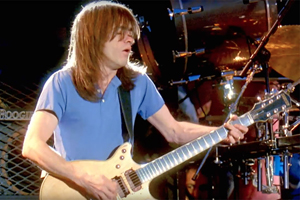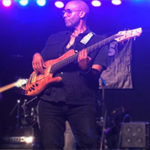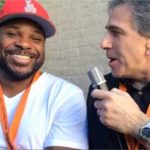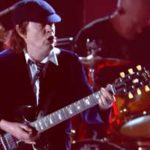Digging into the interview vaults for one of our better talks with the late AC/DC guitarist
By Gary Graff
November 24, 2017
Last Saturday (Nov. 18) the latest rock star death sent another seismic shift through the music world. As the co-founder and rhythm guitarist for AC/DC, Malcolm Young created his own kind of hard rock template, combining Rolling Stones riff consciousness with a the kind of lockstep, almost trancey precision we associate with the best of Krautrock. Young and his music have influenced generations of players in their wake and shot to thrill for generations of music fans. In tribute, we dip back to 2003 for this expansive and insightful chat with Young, around the time AC/DC was entering the Rock and Roll Hall of Fame and also entering its continuing association with Sony Music that included the re-release of the group’s catalog up to that point…
FGPO: What did you have in mind when you started AC/DC?
Young: There was a vision — that was basically that we didn’t have to have day jobs and could get out and play guitar for a living, something you loved doing. It was great if you could give up your day job and spend more time on the guitar. That was our ambition and our vision, and it just got bigger and bigger as the band evolved. But there was no grand sort of plan, not like they have these days. We were just working class people, and we were just glad you could enjoy yourself making money, even if it was 50 bucks a week. And it’s still like that. It’s not changed.
FGPO: Do you still feel like those same kids way back then?
Young: We do, ’cause we were brought up in a pretty lower class system in Glasgow as kids. It was rough. You never got ahead of yourself. If you get too big for your boots, if you’ve got big dreams you’re gonna get them broken or shattered. So we just kept things as they happened. You never take anything for granted. That’s our attitude.
FGPO: What kind of impact did it make to have an older brother, George, who became a rock star with the Easybeats as well as your first co-producer?
Young: He could show you a couple of chords — the other brothers as well. Everyone played a bit of guitar in our family. The Beatles had come along, and I think that really inspired George. When we immigrated to Australia from Glasgow, we were staying in a hostel for immigrants for three or four weeks and he put a band together with other guys there. We never really listened `cause they’d just go off and practice. It wasn’t until they made a record and he came home with it, and the next thing you know it was No. 1 in Australia and we thought “Jeez, how did THIS happen?”
FGPO: Did that make you and Angus want to be rock stars or did you already have musical aspirations of your own when that happened?
Young: Me and Angus were playing guitar already, even before we left Glasgow. We were playing because all the brothers played guitar; that was the thing you did. But you certainly got the idea in our heads, by [George] doing well with his band, you sort of quietly dreamed about it, that you could do it too, one day.
FGPO: So you two were the loudest of the brothers?
Young: [laughs] Yeah, I guess so. We were playing guitar before the Beatles, actually, picking up on things like surf instrumental tunes and things like that, doing them with the open strings because our fingers weren’t big enough [to create] the pressure so you could get a big sound out of these big old acoustic guitars, cheap ones. We used to just fudge around, find the notes. It was from doing that we picked up the kind of heavy thing that became our sound. We spent a lot of time playing guitar. Me and Angus are pretty small; you can drink in Australia at 17 in the bars, and most of our friends got tall and looked 17 and were in the bars when they were 15. Me and Angus couldn’t make it, though. They knew we weren’t 18, so we spent a lot of time from 15 to 18 in the bedroom playing guitar. You just did it every day. You learned to talk and walk and play guitar.
FGPO: How did what we know as the AC/DC sound come from that?
Young: We sort of, from the get-go, I said it was a rock ‘n’ roll band. We’re gonna play rock ‘n’ roll. That’s how we went, and that’s how it’s evolved. I was still playing guitar like a piano to get a vibe of a Little Richard song, so it was things like that, playing rhythm around where the rhythm came from on the record, but with two guitars. I’d listen to a song and say: “Hang on, I like that piano thing,” so I’d play the guitar like that and get the vibe from it, and it just evolved from the get-go. It was pretty obvious what to do; you don’t think about rock ‘n’ roll, you just do it.
FGPO: How did you and Angus develop as a guitar tandem?
Young: From the get-go, I was wise enough to say: “Well, I’m playing rhythm, ’cause Angus could really soar with the leads.” I used to mess around a little bit with lead at the time but not much; Angus, he was just so much better, he just went for it and it was brilliant. My place was sitting with rhythm, and I love rhythm. I’ve always loved it.
FGPO: So how did Angus wind up in the schoolboy outfit?
Young: Well, he just took off with it. I think George said to him once: “You think everyone’s just checking you out there when you’re standing there, so in the end I started moving about a bit on stage ’cause they think you’re nuts, then, and they don’t care.” I think Angus used that approach. George had never done what Angus did, but Angus with his schoolboy uniform said: “They all think I’m fucking nuts anyway, so I may as well act nuts…”
FGPO: And then it took on a life of its own.
Young: It took us by surprise. He just did it. He didn’t say: “I’m gonna do this” or “I’m gonna jump around like a madman.” He just got on and did it. He put the act with it, straightaway, picked up a bit of Chuck Berry with the duck walk and what have you. I think he brown-eyed the audience once, ’cause there were a couple of smart-ass guys up front, and that’s where the dropping his duds came from. It sort of evolved through all these pub gigs in Melbourne and Sydney. and stayed with us ever since.
FGPO: What was it like be working with not only a producer but a producer who was also your older brother?
Young: They would force you — “Come on! You’ve got to do something a little rock ‘n’ roll! Come up with a title, we’ll get a rock ‘n’ roll 12-bar behind it,” and we sort of just got in there and did it. We used to do a lot of writing in the studio; again, we didn’t have a lot of time, so we would come up with a guitar riff and they’d always say: “We need a title. Angus, you’re good for a title, give us a title.” “TNT!” And he had a little line to go with at the time, and Bon had his ideas, “She’s got balls” and things like that, and there were other ideas we had lying around. So we just put them on a bit of paper and went through ’em. You have to get an album done — and quick, ’cause had no other time.
FGPO: Guitars are AC/DC’s hallmark, of course, but you surprised everyone with the bagpipes on “It’s A Long Way To The Top (If You Wanna Rock ‘n’ Roll).” Where’d that come from?
Young: That was another one that was just done in the studio from the title; we just threw some chords behind it and what have you. I think it was George who said: “Maybe get some bagpipes on that,” ’cause the chords that were in it, they were ringing. You’ve got these open G chords in it, and when the two guitars hit on this G string it was giving off a vibe like it could be pipes in there. So George said: “Why don’t we try some pipes in with the lead [guitar] solo, like an answering thing. Bon actually could play flute, not bagpipes, so he got the canter from the bagpipe and played the melody, and then we did the drones separate and put it on and it sounded fantastic.
FGPO: He’s been gone for a long time, but do you feel like Bon is still a part of AC/DC, at least in spirit?
Young: He’s always there. He never left the band. That’s just the way we are. We’re very tight as a unit…He’s always there as far as we’re concerned…You just never forget. There’s too many stories with him, with Bon. It just creeps in everyday; if it’s not one of the bands, it’s a fan. It’s great for us. It just shows you how popular and how long back it remains. The more time passes, the bigger Bon gets, in a way. I think it’s great.
FGPO: AC/DC tends to take a long time between albums anymore. How does that process work?
Young: Well, we never stop, to be honest. We write all the time…and it’s just a matter of when everyone’s in the same spot and we get together and take it up a gear. We’ll just do our duty; we want to make good albums. We’ll deliver our best that we can do. We’re just the band, man; we’ll make it the best we can. It’ll sound like AC/DC, I’ll promise you that.






